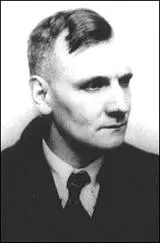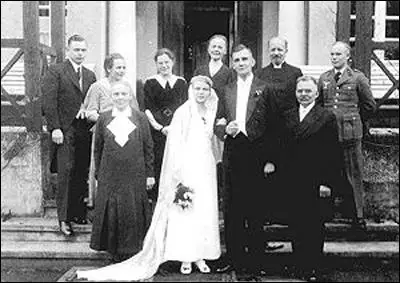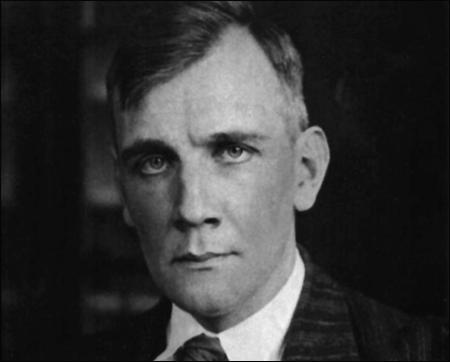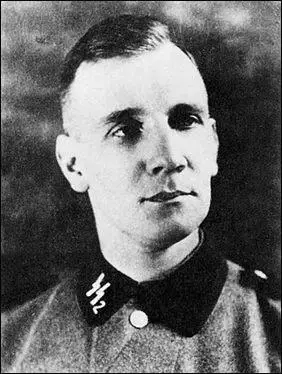Kurt Gerstein

Kurt Gerstein, the sixth of seven children, was born in Münster, Germany, on 11th August 1905. His father, Ludwig Gerstein, was a former Prussian officer, was a judge and an authoritarian figure. According to Saul Friedländer, he proudly proclaimed that in his family's genealogical tree there was only Aryan blood and exhorted future generations to "preserve the purity of the race!" (1) He was also described as a "pious and unbending judge". (2)
Karl Gerstein pointed out that Kurt was the "most difficult" of his siblings and did not relate well to other members of the family. "Brought up by his father in the German traditions of obedience and hard work, he defied his father and took delight in being rebellious and disobedient. He regarded both his parents as cold and remote and felt particularly neglected by his mother." (3)
Kurt Gerstein was a difficult child at school and his teachers found him "lazy" and it was suggested that he failed to respond to the bad reports he was always receiving. However, he was an intelligent boy and in 1925 he had little difficulty being accepted to study at the University of Marburg. He later transferred to the University of Aachen where he graduated in 1931 as an engineer. (4)
During this period he became interested in religion and joined several Christian organizations including the German Association of Christian Students (DCSV), the Evangelical Youth Movement (CVJM-YMCA) and the Federation of German Bible Circles. He was also a supporter of Adolf Hitler and on 2nd May 1933, he joined the Nazi Party and two months later became a member of the Sturmabteilung (SA). (5)
Kurt Gerstein and Nazi Germany
Gerstein strongly disagreed with the Nazi religious policies and in 1933 he sent protest telegrams to Hitler Youth leader, Baldur von Schirach and Bishop Ludwig Müller, the new leader of the Reich Church. (6) Müller had recently made controversial comments including the view that "Christ was an Aryan" and that traditional Christianity was "whole-hearted Bolshevism under a tinsel of metaphysics". (7) Müller and the German Christians attempted to merge the Christian doctrine with Nazi ideology and with German mythology. They also sought to purge the Christian religion of its Jewish roots. For example, Jesus of Nazareth was turned into an "Aryan hero" and attempts were made to remove Old Testament studies from the school curriculum. (8)
In 1935 Kurt Gerstein protested at a performance of the anti-Christian play Wittekind by Edmund Kiss. As a result he got beaten up and "received a black eye, a cut mouth and some broken teeth". (9) " His reaction to further depredations by the Nazis on the Church was always extreme. His stance for what he saw as purity, and against Nazi obscenity, was fanatical, and yet friends remember a man who had a good sense of humour and a great capacity for irony." (10)
The following year he was arrested and imprisoned for having anti-Nazi literature. Released after only six weeks, Gerstein found that he had been dismissed from his job with the Miners' Association. He considered devoting his life to religion but eventually decided to go to the Protestant Missions Institute to study medicine. (11)

Kurt Gerstein married his long-term fiancee, Elfriede Bensch, on 31st August 1937. However, he continued his anti-Nazi work and in 1938 he was arrested and sent to a concentration camp. He was released after six months owing to lack of evidence. With the help of the son of Hugo Stinnes, he got a job in a potassium mine in Thuringia. (12)
Waffen SS
In 1941 Gerstein's sister-in-law, Bertha Ebeling, was a victim of the euthanasia program directed at the mentally ill. (13) Gerstein responded by joining the Waffen SS in order "to see things from the inside", to try to change the direction of policies, and to publicize the crimes being committed. (14) In a letter to his wife he told her that he had joined the SS as an "agent of the Confessing Church." (15) Gerstein later claimed he was working for Martin Niemöller. (16)
Gerstein went to work in the hygiene section of the medical department of the SS where he designed a water filter for German troops. In January 1942 he was promoted and became head of the Technical Disinfect ion Department where he worked with poisonous substances. He visited several concentration camps to examine the possibility of using the highly toxic gas, Zyklon B, on the inmates.

Kurt Gerstein was sent to Belzec Extermination Camp to meet with Christian Wirth. While there he witnessed the killing of an entire trainload of Jews: "When the train arrived many were already dead, having been packed into the train with no room to move or lie down. The survivors were told that they were being sent to the bathhouse to be disinfected. They were assured that they would come to no harm and that they should breathe deeply to ensure that infectious diseases were prevented. The people were herded naked into the gas chamber. Families still clung together, children holding their parents' hands, husbands putting protective arms around their wives. The doors were slammed shut and the diesel pumping engine was started. Almost immediately it broke down.... The minutes passed while engineers were brought in to mend the faulty engine. From inside the gas chamber the sound of crying could be heard. Periodically an SS officer peered through the glass window in the door of the chamber to see what was happening inside. He reported that they were wailing like they did in the synagogue. This officer seemed to feel no sorrow or pity for the wretched souls squashed inside the small chamber, bodies pressed so tightly together that there was no room to turn or shift their weight from one leg to the other; no room for a mother to bend to comfort the small child clinging to her legs. Eventually, after being trapped for more than two hours, the diesel engine croaked into life, but it took another thirty minutes of pumping the deadly carbon monoxide into the chamber before everyone inside was dead."
Gerstein later told a friend: "One could tell families even in death. They were still holding hands, stiffened in death so that it was difficult to tear them apart to clear the chamber for the next load." Gerstein was then shown how the bodies were processed: "With gold to the left - without gold to the right.... Dentists hammered out gold teeth, bridges and crowns. In the midst of them stood Captain Wirth. He was in his element and, showing me a large can full of teeth, he said, See for yourself the weight of that gold! It's only from yesterday and the day before. You can't imagine what we find every day - dollars, diamonds, gold. You'll see for yourself!" (17)
While travelling back by train to Germany he found himself sharing a compartment with the diplomat Göran von Otter, who was based at the Swedish Legation in Berlin. Gerstein told him that "I saw something awful yesterday. Can I come and see you at the Legation?" Von Otter suggested that they should speak about the matter straight away. Gerstein then told him about the visit to Belzec. (18)
"There were beads of sweat on his forehead. There were tears in his eyes... We stood there together all night, some six hours or maybe eight, and again and again Gerstein kept on recalling what he had seen. He sobbed and hid his face in his hands. From the very beginning as Gerstein described the atrocities, weeping and broken-hearted, I had no doubt as to the sincerity of the humanitarian intentions." (19)
Kurt Gerstein begged Von Otter to pass what he had told him on to the Allies so that they might do something to stop the killing. He made a full report and handed it to his superiors. According to Anton Gill, the author of An Honourable Defeat: A History of German Resistance to Hitler (1994): "Von Otter duly made a report to his government, but it was suppressed because the Swedes did not want to damage their trade relations with Germany." (20)
Walter Laqueur, the author of The Terrible Secret (1980), has put forward another theory for this decision: "The argument that the Swedish Government found it too risky to pass the information to the Allies can hardly be taken seriously for there were, of course, ways and means to transmit it without directly implicating the Swedish Government. If so, why was the report not leaked at least to the press? Because, to put it in the shortest possible way, it was August 1942. The Swedish Embassy in Berlin was besieged by unfortunate Jews." Laqueur believes that the numbers requesting entry to Sweden would increase if this information became public. (21)
The German Church
Gerstein also told his contacts in the Confessional Church. This included Bishop Otto Dibelius and Martin Niemöller. He also passed the information to Diego Cesare Orsenigo, the representative of the Vatican in Berlin. However, he was a supporter of Adolf Hitler and refused to take any action. He told Pope Pius XI that he advocated conciliation out of a fear that if the Church came into conflict with the Nazi government it would lead to "lapsed religiosity among German Catholics". He argued that "unless the clergy appeased the regime and relieved members of the church of a conflict of conscience". (22)
Gerstein later reported: "My attempt to report all this to the head of the Legation of the Holy See had no great success. I was asked if I was a soldier. Then I was denied any kind of interview and was requested to leave the legation forthwith. I relate this to show how difficult it was, even for a German who was a bitter enemy of the Nazis, to succeed in discrediting this criminal government.... I continued to inform hundreds of people of these horrible massacres. Among them were the Niemöller family; Dr Hochstrasser, the press attaché at the Swiss legation in Berlin; Dr Winter, the coadjutor of the Catholic Bishop of Berlin - so that he could transmit my information to the Bishop and to the Pope; Dr Dibelius, and many others. In this way thousands of people were informed by me." (23)
Owen Chadwick, the author of Britain and the Vatican During the Second World War (1988) states that "Diego Cesare Orsenigo saw nothing but ill to come from a breach between the Church and a Nazi State. As an Italian he believed in the Fascist State. His ideas on what ought to happen in Germany were formed on the basis of what happened in Italy". (24)
Bishop Dibelius also did nothing with this information. After the war he claimed that he was not aware of the "full implications" of the final solution. "There was no evidence which would have stood up in a court of law; no cardinal or bishop was ever permitted to visit Auschwitz, Sobibor or Treblinka. Their knowledge was based on hearsay, but it is unlikely that they had any doubts as to the authoritative character of this information." (25)

Kurt Gerstein surrendered to French forces in the town of Reutlingen on 22nd April 1945. The following month he was interviewed by Major D. C. Evans of the British Army and Major John W. Haught of the United States Army. "Kurt Gerstein told us that we were the first British and American personnel he had seen and that he wanted to speak to us regarding what he knew about German concentration camps. He informed us that he was a personal friend of Pastor Niemöller and that, working for him as a secret agent, he had obtained a post of responsibility in the Nazi Party. In this capacity, he had been present at meetings which dealt with the fate of prisoners in the concentration camps. When he was asked whether he was familiar with the use of gas chambers for killing prisoners, he replied that as an engineer he had often been called upon to advise on the workings of these installations. He said that the two gases used were hydrocyanic acid and the exhaust gas of internal combustion engines... Dr Gerstein fled from the Nazis only three weeks ago. He is evidently still affected by his experiences and has difficulty in talking about them. But he is anxious that the guilty parties be brought to trial for their crimes and states that he is prepared to act as a witness. He hopes that the information he has supplied will be transmitted as quickly as possible to the competent authorities in London." (26)
Kurt Gerstein also told the two officers that he had tried to give his report to the French authorities to whom he had surrendered, but that they were not interested in receiving it. In June 1945 he was taken to Paris and then put into the Cherche-Midi Military Prison and held by the French as a war criminal. "Conditions in the prison were disgusting, the cells were full of lice, it was cold and dark and the food was terrible." (27)
Kurt Gerstein was found dead in his cell on 25th July, 1945. He appeared to have torn a strip from his thin blanket and committed suicide. It was never discovered whether this was a result of the conditions he had to suffer or whether he found it impossible to endure being regarded as a war criminal.
In August 1950, Gerstein's name was put before the Denazification Court in Tübingen. The court ruled: "After his experiences in the Belzec camp, he might have been expected to resist, with all the strength at his command, being made the tool of an organized mass murder. The court is of the opinion that the accused did not exhaust all the possibilities open to him and that he could have found other ways and means of holding aloof from the operation." The Premier of Baden-Württemberg overturned this verdict on 20th January 1965.
Primary Sources
(1) Susan Ottaway, Hitler's Traitors, German Resistance to the Nazis (2003)
A solitary child, Kurt Gerstein did not relate well to his brothers and sisters or to other members of his family. Brought up by his father in the German traditions of obedience and hard work, he defied his father and took delight in being rebellious and disobedient. He regarded both his parents as cold and remote and felt particularly neglected by his mother.
At school his behaviour was no better. Although he was intelligent and attended three different grammar schools as a result of his father being moved from Saarbrucken to Halberstadt and then on to Neurippin, he was lazy and totally unconcerned about his teachers' unfavourable opinions of him. He found it amusing to be regarded in such a bad light and no amount of chastising could make him change his ways. He "thumbed his nose" at authority and took absolutely no notice of the bad reports he was always receiving. In spite of this attitude he worked sufficiently well to be able to graduate from his grammar school and attend university.
(2) Anton Gill, An Honourable Defeat: A History of German Resistance to Hitler (1994)
Kurt Gerstein... came from a conservative, traditional family in Munster, where the values of obedience and stoicism had been bred into him from childhood. Obedience was not something to which he was inclined naturally, but he grew up conventionally, though his attachment to the Evangelical Church was noticeably passionate. At the end of 1933, despite having already joined the SA, Gerstein sent two telegrams protesting against the disruption by the Nazis of German evangelical youth work, in which he was deeply involved. The recipients of these, Nazi Youth Leader Baldur von Schirach and State Bishop Ludwig Muller, did not react, but the early protest was a courageous one. Further moves against the Church compounded Gerstein's outrage, and as Nazi skulduggery all round him became unbearably evident, so there grew within him a need to bear witness to the crimes of the regime which would not be denied.
In Hagen in 1935, the local Roman Catholics demonstrated at a performance of the anti-Christian play Wittekind by Edmund Kiss. The riot was quashed by the police. The following day, Gerstein booked a front-row ticket and from it conducted his own solo demonstration. In the fight which followed he lost several teeth. Although the introduction of the Nuremberg laws against Jews does not appear to have affected him (he came from a conventionally, but not violently, anti-Semitic background), he did help one Jewish convert friend to continue his theological studies. His reaction to further depredations by the Nazis on the Church was always extreme. His stance for what he saw as purity, and against Nazi obscenity, was fanatical, and yet friends remember a man who had a good sense of humour and a great capacity for irony.
He was first arrested in 1936 for organising the First Congress of the Miners' Association of the Saar, and though the Confessing Church, with which he was closely associated, interceded for him and prevented his imprisonment, he was dismissed from the Party. His dominant father forced him to apologise and recant. All his older brothers and his father were by now Party members. Not belonging was a severe hindrance to a career. He obeyed, but nevertheless continued his fight, through pamphlets and publications which he financed from the private income he derived from the family firm in Dusseldorf. Significantly, one series of pamphlets was called Of Honour and Purity, in which he was clearly trying to square his conscience and beliefs with Nazi ideology, but he was re-arrested in summer 1938 and accused of monarchist plotting. By now he was married and had started a family.
He was sent to a concentration camp for six months, but was then released owing to lack of evidence. Although his father continued to support him, Gerstein became depressed and pessimistic. He had used up his private supply of money on his pamphleteering, and had not been in work for a year. An attempt to take up medical studies foundered, as did another to read theology. Finally, with the help of a powerful industrialist, Hugo Stinnes Jnr, he got a job in a potassium mine in Thuringia in the summer of 1939.
(3) Kurt Gerstein, statement to Major D. C. Evans and John W. Haught (May, 1945)
My attempt to report all this to the head of the Legation of the Holy See had no great success. I was asked if I was a soldier. Then I was denied any kind of interview and was requested to leave the legation forthwith. I relate this to show how difficult it was, even for a German who was a bitter enemy of the Nazis, to succeed in discrediting this criminal government....
I continued to inform hundreds of people of these horrible massacres. Among them were the Niemöller family; Dr Hochstrasser, the press attaché at the Swiss legation in Berlin; Dr Winter, the coadjutor of the Catholic Bishop of Berlin - so that he could transmit my information to the Bishop and to the Pope; Dr Dibelius, and many others. In this way thousands of people were informed by me.
(4) Report by Major D. C. Evans and John W. Haught, on their interview with Kurt Gerstein (May, 1945)
Kurt Gerstein told us that we were the first British and American personnel he had seen and that he wanted to speak to us regarding what he knew about German concentration camps. He informed us that he was a personal friend of Pastor Niemöller and that, working for him as a secret agent, he had obtained a post of responsibility in the Nazi Party. In this capacity, he had been present at meetings which dealt with the fate of prisoners in the concentration camps. When he was asked whether he was familiar with the use of gas chambers for killing prisoners, he replied that as an engineer he had often been called upon to advise on the workings of these installations. He said that the two gases used were hydrocyanic acid and the exhaust gas of internal combustion engines. He was unable to give any details of the concentration used, but he said that with HCN death was almost instantaneous, while in the case of exhaust gas it took fifteen to twenty minutes.Dr Gerstein fled from the Nazis only three weeks ago. He is evidently still affected by his experiences and has difficulty in talking about them. But he is anxious that the guilty parties be brought to trial for their crimes and states that he is prepared to act as a witness. He hopes that the information he has supplied will be transmitted as quickly as possible to the competent authorities in London. He handed over to the signatories a note in English, a seven-page typewritten report and some invoices from the firm of Degesch for the supply of Zyklon B to concentration camps. He also showed us, as evidence of his past activities, a religious pamphlet written by him in 1938. There is reason to consider whether Dr Gerstein should not be protected against the local Nazis.
(5) Walter Laqueur, The Terrible Secret (1980)
Both Catholic and Protestant church leaders (such as the German Bishop Dibelius) have claimed after the war that until the very end they were not aware of the full implications of the final solution. This may well be true if the stress is put on the "full implications". There was no evidence which would have stood up in a court of law; no cardinal or bishop was ever permitted to visit Auschwitz, Sobibor or Treblinka. Their knowledge was based on hearsay, but it is unlikely that they had any doubts as to the authoritative character of this information.
Student Activities
Kristallnacht (Answer Commentary)
Adolf Hitler's Early Life (Answer Commentary)
Heinrich Himmler and the SS (Answer Commentary)
Trade Unions in Nazi Germany (Answer Commentary)
Adolf Hitler v John Heartfield (Answer Commentary)
Hitler's Volkswagen (The People's Car) (Answer Commentary)
Women in Nazi Germany (Answer Commentary)
German League of Girls (Answer Commentary)
